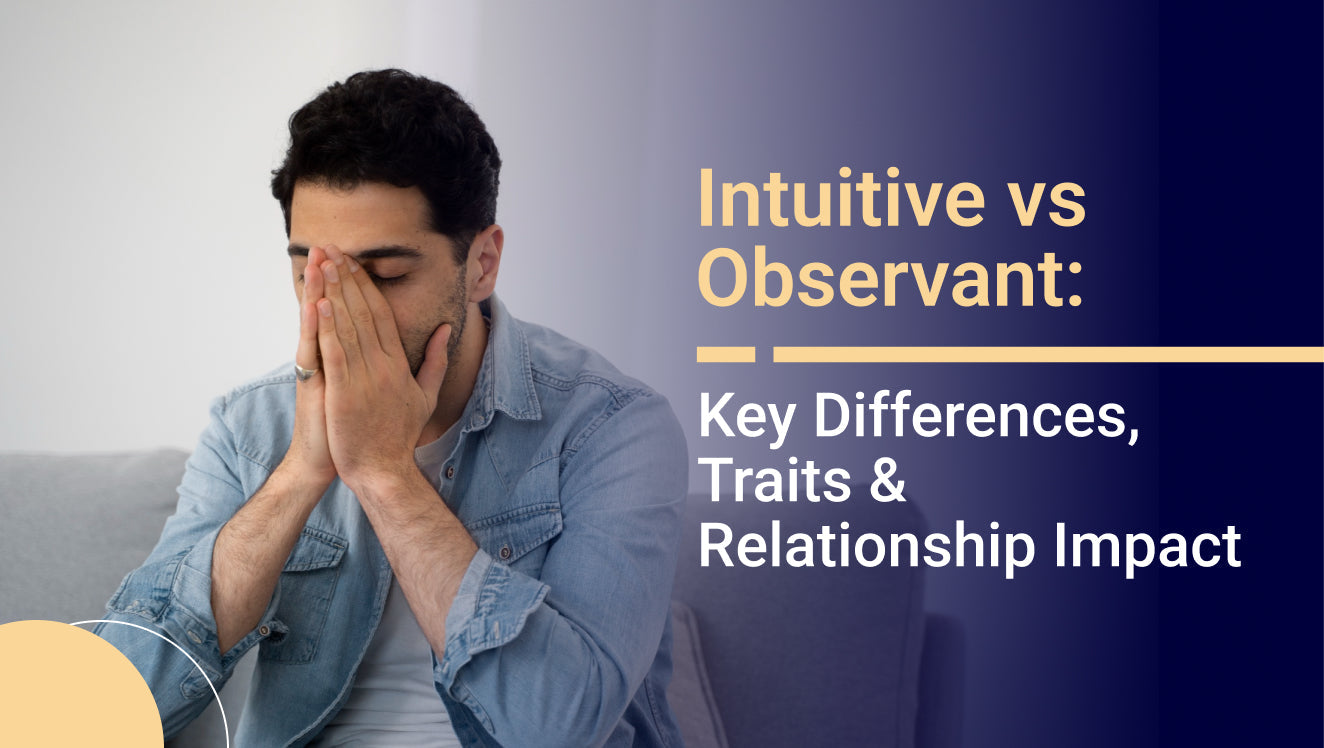Intuitive individuals rely on their gut feelings, imagination, and abstract thinking to understand the world, often focusing on possibilities and future implications. Observant individuals, on the other hand, are more grounded in concrete facts, details, and the present moment, preferring practical approaches based on what they can directly observe
When people explore their personality type, one of the most confusing yet important distinctions they come across is between being Intuitive and Observant two traits that shape how we process information, notice details, and make decisions. These traits are part of the "Mind" or "Sensing vs. Intuition" axis of many personality frameworks, including MBTI and 16Personalities.
If you've ever wondered, “Am I more of an observant realist or an intuitive visionary?”, this guide will help you figure that out.
What Does It Mean to Be Intuitive or Observant?
The key difference lies in how we absorb and interpret information from the world.
What Is an Observant Personality Type?
Also called “Sensing” in traditional MBTI, Observant types are practical, detail-focused, and grounded in the present. They rely heavily on their five senses and prefer dealing with facts, past experiences, and tangible data. They often ask:
-
What’s happening right now?
-
What can I see, touch, or measure?
-
What worked before?
Observant people excel at staying present, remembering fine details, and responding well to concrete problems. They're often practical professionals, planners, and realists.
What Is an Intuitive Personality Type?

Intuitive types (represented as “N” in MBTI) focus on patterns, meanings, and future possibilities. They look beyond what's immediately visible and prefer abstract thinking. They tend to ask: Check out the thinking vs feeling
-
What does this mean?
-
Where could this lead?
-
What’s the bigger picture?
Intuitive people are typically imaginative, strategic, and open to new ideas. They enjoy exploring concepts, theories, and unseen connections.
How Do You Know If You’re Intuitive or Observant?
While most people have a mix of both traits, you likely lean strongly in one direction. Here's a quick way to identify which one sounds more like you:
|
Trait |
Observant |
Intuitive |
|
Focus |
Present moment |
Future possibilities |
|
Thinking style |
Concrete, realistic |
Abstract, theoretical |
|
Interests |
Facts, data, real-life examples |
Ideas, concepts, symbols |
|
Communication |
Straightforward, literal |
Figurative, imaginative |
|
Problem-solving |
Practical solutions |
Innovative or conceptual ones |
|
Memory |
Strong recall of facts & events |
General impressions & patterns |
Still unsure? Ask yourself:
-
Do I prefer real-world facts or brainstorming new ideas?
-
Am I drawn to what is or what could be?
Intuitive vs Observant in Relationships
This is where the difference can really show up.
Observant Types in Relationships
Observant partners often express love through actions. They notice the small things a changed hairstyle, a favourite meal and prefer consistent, dependable affection. They may struggle with vague or overly emotional conversations.
Intuitive Types in Relationships
Intuitive partners, on the other hand, love deep conversations, philosophical debates, and emotional bonding. They’re more focused on long-term vision and possibilities for the relationship. However, they may miss practical day-to-day needs or routines.
Relationship tip: Mixed pairs (one intuitive, one observant) can struggle at times, but they also balance each other beautifully if they respect each other's perspective.
Is It Better to Be Observant or Intuitive?
Neither is better but each has strengths in different contexts.
Observant personalities thrive in:
-
Emergency or fast-paced environments
-
Logistics and operations
-
Maintenance, teaching, healthcare, and law enforcement
Intuitive personalities thrive in:
-
Strategy and innovation
-
Future planning, vision casting
-
Creative industries, psychology, research, and design
What matters most is self-awareness from any mind diseases. Once you understand your style, you can build on your strengths and grow in your blind spots.
Closing Thoughts: Which One Are You?
Whether you identify more with intuition or observation, this trait influences how you communicate, make decisions, and interact with others. Recognising your preference can improve your career, relationships, and personal growth.
If you’re not sure where you fall, take a personality assessment like the one at 16Personalities or reflect on your behaviours in daily life:
-
Do you love imagining “what ifs” or prefer focusing on “what is”?
-
Do you trust your gut or your senses?
The better you understand yourself, the better you can navigate your world.
FAQ
What is the difference between observational and intuitive?
Someone with strong intuitive tendencies tends to interact with the world through the lens of emotional and internal experience. Observation is the action or process of watching or listening to something or someone carefully in order to gain information.
What does it mean to be an intuitive person?
An intuitive person is someone who has the ability to understand or know something without conscious reasoning or based on evidence. They often rely on gut feelings and instincts to make decisions or understand situations. This ability is sometimes described as a "sixth sense" or a deep, non-logical impression.
Can you be both observant and intuitive?
Some individuals are better at being observant than having intuition and others are better at the opposite. There is also the possibility that someone could be consistent with having both intuitive and observant traits!
Disclaimer: neuroVIZR is a wellness device created to promote relaxation, focus, and overall brain wellness. It is not a medical device, does not provide diagnoses, and is not intended to treat, cure, or prevent any medical condition. The device is not suitable for individuals with epilepsy. Experiences and results may vary from person to person.




























Share:
INFJ Strengths and Weaknesses: The Empathic Visionary Explained
N vs S in Myers-Briggs: Key Differences & Type Examples